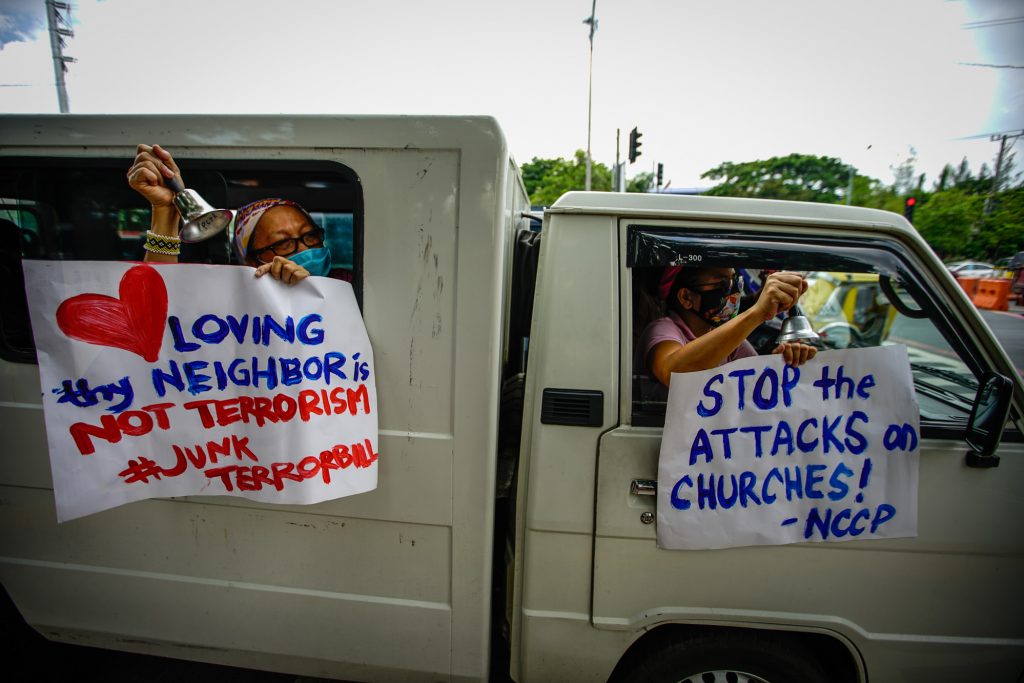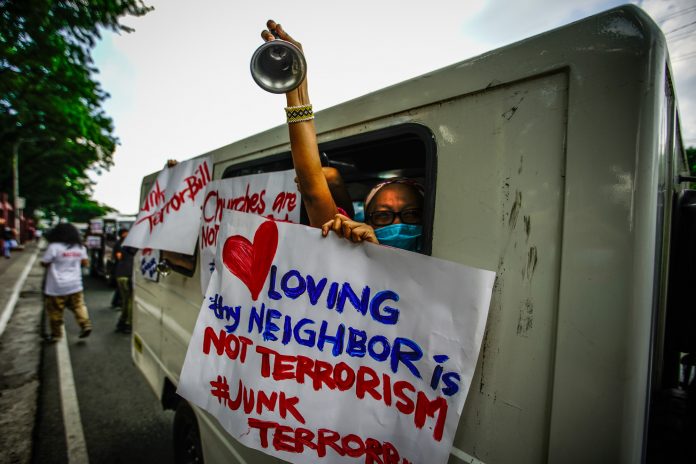“We wait for peace to no avail; for a time of healing, but terror comes instead.” – Jer. 8:15
WE, the Association of Major Religious Superiors in the Philippines, are deeply concerned by troubling developments in our midst even as the pandemic continues to wreak havoc to our lives.
While our embattled nation continues to suffer from the tempests of the COVID-19 virus, and its effects on the lives of millions of Filipinos, especially the poor, the leaders of the land have, unfortunately, been trying to fast track the passage of a controversial House Bill (HB) No. 6875, which seeks to amend Republic Act 9372, also known as the “Human Security Act of 2007.”
On the 29th of May, 2020, the House of Representatives decided to adopt, in toto, the recently-approved Senate Bill entitled “An Act To Prevent, Prohibit and Penalize Terrorism, thereby Repealing Republic Act Number 9372, Otherwise Known As The ‘Human Security Act of 2007.’”. President Duterte then wrote to the Congress to deem the said bill as “priority”, thus expediting the usual process of legislation, or as Senate Pres. Sotto puts it, “deemed as passed.”
While we agree acts of violence have indeed ravaged our beloved land, causing the deplorable loss of lives of many of our sisters and brothers, and other effects of such adverse acts, we firmly believe that only through efforts for peaceful resolution of hostilities while addressing the root causes of such violent acts comprehensively, and not just militarily, will genuinely answer the roots of violence that is rampaging across our land.
We are women and men of peace. Dialogue is our way and we believe peace is the fruit of justice. Thus, we denounce the wicked and the ruthless as the Holy bible says: “The wicked man writhes in pain all his days, and numbered are the years stored up for the ruthless.” (Job 15:20)
In the midst of a pandemic it seems government has been deaf to the cries for mass testing, relief for the most vulnerable and the poorest of the poor, protection for our health workers and a comprehensive plan to address this public health issue without draconian measures to curtail fundamental rights and freedoms.
These are the urgent concerns that we as a people need to address. These are the challenges that government can address by channeling resources for its resolution.
Instead we see our legislators addressing other peripheral issues that fail to answer lingering questions about the effectiveness, efficiency, competence and foresight of government leaders. Covid-19 is the enemy in our midst. Terrorism is not our immediate concern. Marawi’s rehabilitation and the continued displacement of communities should be our priority. People’s health, safety and well-being should be first in our agenda.

Sadly, we traverse the path of the wicked and ruthless. Our legislators chose to prioritize an Anti-Terrorism Bill that seeks to amend the Human Security Act of 2007.
- We are bothered by the broad and vague definition of terrorism and terrorist. It can include acts of dissent, free speech, right to assemble, right to organize, freedom of belief, among others. By such a broad definition it is open to abuse and misuse.
While the Section IV of the Bill does indeed acknowledge that “terrorism, as defined in this Section shall not include advocacy, protest, dissent, stoppage of work, industrial or mass action, and other similar exercises of civil and political rights”, Human Rights lawyers, civil libertarians and other cause-oriented groups have raised their concerns over the bill, saying that there are red flags all over the bill, thus prone to be misused by persons in authority.
With the very vague definition of terrorism and other terrorist activities (SB Sec 4, 5, 6, 7, 8, 9, 10, 11, 12) in the said Bill, and the track record of the current administration in cracking down on any perceived dissent (which became even more evident by its crackdown on certain groups and even individuals who posted their criticism on how the government is handling the current crisis in social media) this Bill can be used to stifle dissent and curtail rights to free speech, to organize and form associations, to peaceable assemble in redress of grievances. - We are wary that the bill runs contrary to the fundamental law of our land – the Philippine Constitution.
We find that the contents of the proposed Anti-Terrorism Bill, which is now being rushed in the Congress, to be terribly disconcerting to say the least. An example is the creation of the Anti-Terror Council (ATC), based on Sec. 25 of SB 1083. According to the SB, the ATC will be composed of the Executive, the secretaries of the DILG, DND, DFA, DOJ, DOF, ICT, the National Security Adviser, and the AMLC Executive Director can “designate”, after finding of probable cause, any person or entity as a terrorist or a terrorist group. However, there are no provisions on how these persons or entities unilaterally branded as “terrorists” can present counter-evidences proving otherwise in the courts of law, and their bank accounts and assets “freezed” by the AMLC (exactly what happened to the Rural Missionaries of the Philippines, our oldest Mission Partner, after going through the ordeal of incessant red-tagging by the AFP).
Even the mere powers of the ATC, such as being able to order the arrest of any suspected individual and detention without charges for up to 14 days (extendable to 10 days), is already a clear usurpation of the power of the Judiciary and a violation of the Constitutional provision of allowing only up to 72 hours (3 days) of detention. Even the provision regarding the 60-90 days of surveillance and possible wiretapping of communications which only requires a written authorization from the Court of Appeals (Sec 16, Sec 18, Sec 19), are already clear violations of the right to privacy of communications based upon mere suspicion. These are reminiscent of the PD 1836 and PD 1877 of the late dictator Ferdinand Marcos. - We are deeply concerned that this bill if it becomes law will further shrink democratic space and curtail fundamental rights and freedoms. We are witness to the unceasing attacks on the right to life through extrajudicial killings, the right to be free from torture, cruel, inhuman or degrading treatment or punishment, free speech and freedom of the press, right to information and right to organize. Even now organizations and individuals critical of government policy have been red-tagged and subjected to harassment and vilification online and offline. This bill will only exacerbate the very precarious human rights situation.
- We believe that this bill will only worsen the division and disunity of our society and peoples. By drawing the line between friend and enemy we might see no end to the spiral of violence in our midst. Four years ago, it was a war against drugs and drug addicts, then a new front was opened with a whole of nation approach to end the local communist insurgency and now we seek a new war that may encompass and consume us all – a war against “terrorism and terrorists”.
- We fear the return of an authoritarian order with too much power concentrated in the hands of the executive branch of government. The law is weaponized to deal with perceived enemies and critics without resorting to an open declaration of martial law.
Political dissent and criticism are very much part of democracy. They ensure the checks-and-balance of powers of the officials of the government, pushes them to act more justly, removes any ambition of any ruling administration to authoritarianism, and helps to shape the course of the people’s narrative as a nation. Any attempts to silence or stifle them is a great disservice to the aspirations of our nation to be a “just and humane society” (Preamble of the 1987 Philippine Constitution).

Now is not the time to further erode our people’s confidence in government. We urgently need to address the COVID-19 crisis as a united people.
We have transitioned to a general community quarantine and businesses are open and the working class have been ordered to return to work. Business as usual is the talk of the town with no mass transport, no safeguards for workers and no clear plan for the future.
“Then the LORD said to Moses: Go to Pharaoh and tell him: Thus says the LORD: Let my people go to serve me.” (Exo. 7:26)
Meanwhile churches remain under strict rules of 10 persons in a church activity. If we can open businesses and malls where surely mass gatherings and contacts can occur why can we not open churches so that our people may find solace and may partake of the body and blood of our Lord Jesus Christ? Our front-liners need most these places of worship to keep their sanity and draw inspiration to make them stronger in fighting the pandemic.
We understand the necessity of starting up the economy to stave off recession and collapse. We are one with government in this endeavor but we must assert that churches fulfill an essential function in our – spiritual sustenance and upliftment. In the lock down it was the churches who responded and ably provided relief and other forms of assistance to the poor and dehumanized. With sufficient safeguards to be put in place we find no reason to prevent the faith communities to celebrate the Holy Eucharist and be in communion with our Triune God.
Our people need hope and our faith renews that hope even in these most trying of times. Allow us to pray, allow us to heal and find lasting love in His forgiving and compassionate arms.
Signed:
Fr. Cielito Almazan, OFM & Sr. Marilyn Java, RC
AMRSP Co-Chairpersons









